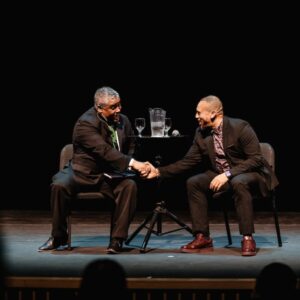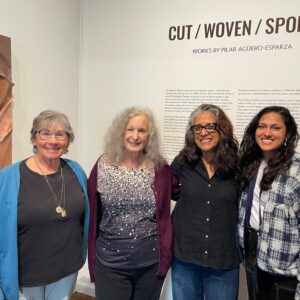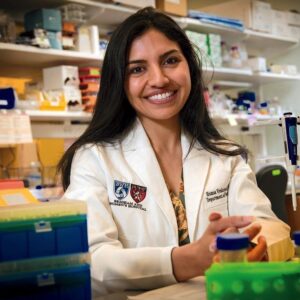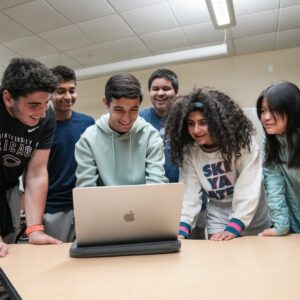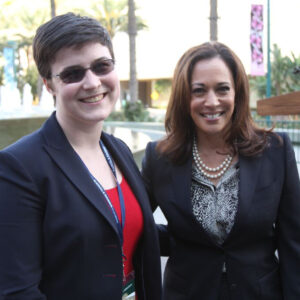This story was originally published in the spring/summer 2023 issue of Harker Magazine. It is also available to read on issuu.
When Zarek Drozda ’16 arrived at Harker in eighth grade, he had already lived in six states.
“My dad worked in corporate mergers and acquisitions, so we moved a lot; but my parents were very good at helping my brother and me look at each transition as a new opportunity – and it helped me enjoy change,” said Drozda from his apartment in Chicago, where he lives with his partner and their two cats. “That being said, I was grateful when I joined Harker and got to stay because it is such an incredible school.” Drozda made the most of his time at Harker. He was a John Near endowment scholar, debate captain, stage manager, theater technician and Middlebury Institute CIF researcher in addition to juggling a rigorous academic load. He enjoyed all his classes but particularly took to economics.
“As a student, Zarek was a voracious learner coupled with a positive demeanor and a great sense of humor. He loved to explore new ideas and theories, not for a grade or a test, but for the joy of learning and discovery itself,” said Samuel Lepler ’96, an economics teacher who also mentored him as a Near scholar. “I am not surprised that he has been so successful in college and beyond, and that he is giving back to the community with his current work. He embodies what school should be about: the joy of discovery, embracing and overcoming challenges, and laughing all the way.”
Drozda enjoyed economics so much that he went on to study it at the University of Chicago, graduating in just three years. He was very involved in the school, serving as treasurer of the university’s Inter-House Council; ambassador with the Institute of Politics; a member of the Transportation & Safety Advisory Board and Campus Catalyst Board; and co-creator of two student organizations: The Paul Douglas Institute and Global Student Policy Alliance.
His work with The Paul Douglas Institute led to his first job after graduation at the Center for RISC (Radical Innovation for Social Change) at the University of Chicago. While Drozda was at RISC, he worked with economist and “Freakonomics” co-author Steven Levitt, who released the podcast “America’s Math Curriculum Doesn’t Add Up.” The podcast went viral and the team realized they had hit a nerve.
“Nearly everyone believes that math education in America is messed up. Too many kids, even if they’re good at math, opt out of the topic at their first possible chance,” said Jeffrey Severts, co-founder of the Center for RISC, who is a mentor to Drozda and describes him as incredibly dedicated and selfless. “Through Zarek’s tireless efforts, more and more students, teachers and administrators are starting to question whether today’s math fits with the modern world full of computers and data.”
It’s been an eventful ride for Drozda, who worked with the U.S. Department of Education before being tapped to be director of Data Science 4 Everyone, a nonprofit based at the University of Chicago, that is helping lead a national coalition for incorporating data science education into K-12 curriculum. There are now 14 states with data science education pilot programs across the country, driven by Data Science 4 Everyone and its national partners, and their work is extending across school subjects. In California, several schools and districts have adopted these programs:
- San Diego Unified is rolling out data science to 120,000 students across TK-12 mathematics learning, with current opportunities in high school and soon to reach students as young as fifth grade with more foundational “data literacy.”
- Khan Lab School in Mountain View is piloting an advanced second-year data science course that will introduce machine-learning and advanced statistical methods in the context of “big data.” The school is also re-scoping the traditional Algebra 1-Geometry-Algebra 2 sequence to allow for more modern content.
- Los Angeles Unified and researchers at UCLA developed a course under a National Science Foundation grant and have since expanded to 17 California school districts plus other districts in Idaho, New Jersey and Oregon.
And this is just the beginning.
“The importance of teaching students data literacy and data science techniques cannot be underestimated; did you know that every second we create enough data to fill 50 new Libraries of Congress?” asked Drozda with an urgency to make change. “Our vision is that people become more comfortable understanding, manipulating and using data.”
His work to modernize the curriculum could impact the face of education in profound ways.
“Zarek has quickly become one of the nation’s leading voices calling for change, “ said Severts. “If a math revolution happens and kids in K-12 classrooms start learning more about data science, it will be in large part because of Zarek’s efforts.”
Vikki Bowes-Mok is a freelance writer and editor.



